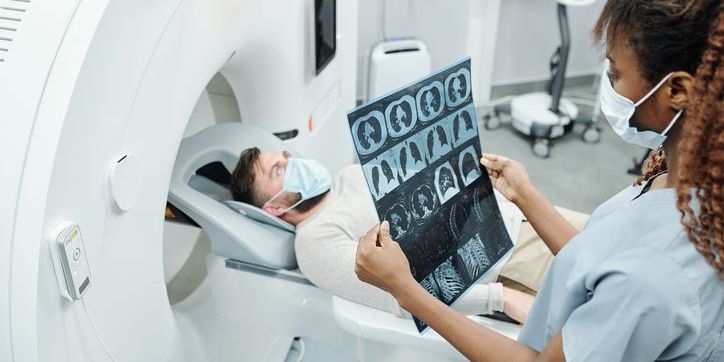What is a Nuclear Medicine Technologist?
A nuclear medicine technologist works with radioactive materials and imaging equipment to perform diagnostic and therapeutic procedures. They prepare and administer radioactive drugs, known as radiopharmaceuticals, to patients for imaging scans or treatments. Nuclear medicine technologists operate imaging devices such as gamma cameras, PET (positron emission tomography) scanners, and SPECT (single-photon emission computed tomography) scanners to capture images of the distribution of radiopharmaceuticals within the body. These images help physicians diagnose and evaluate various medical conditions, including cancer, heart disease, neurological disorders, and bone abnormalities.
What does a Nuclear Medicine Technologist do?

Duties and Responsibilities
Nuclear medicine technologists have a wide range of duties and responsibilities, including:
- Preparing and Administering Radiopharmaceuticals: Nuclear medicine technologists prepare radioactive drugs, known as radiopharmaceuticals, for administration to patients. They calculate and measure the appropriate dosage of radiopharmaceuticals based on the patient's weight, age, and medical condition. Technologists ensure that radiopharmaceuticals are administered safely and accurately, following strict protocols to minimize radiation exposure to patients and staff.
- Operating Imaging Equipment: Nuclear medicine technologists operate specialized imaging equipment, such as gamma cameras, PET (positron emission tomography) scanners, and SPECT (single-photon emission computed tomography) scanners, to capture images of the distribution of radiopharmaceuticals within the body. They position patients correctly for imaging scans, adjust equipment settings, and monitor image quality to ensure accurate and diagnostic results.
- Performing Imaging Procedures: Nuclear medicine technologists perform a variety of imaging procedures to evaluate and diagnose medical conditions. These procedures may include bone scans, cardiac stress tests, thyroid scans, PET scans, and brain scans, among others. Technologists follow established protocols and guidelines to conduct imaging studies safely and efficiently, obtaining high-quality images for interpretation by radiologists or nuclear medicine physicians.
- Ensuring Patient Safety and Comfort: Nuclear medicine technologists prioritize patient safety and comfort throughout the imaging process. They explain procedures to patients, answer questions, and address concerns related to radiation exposure and imaging techniques. Technologists monitor patients during imaging scans, providing reassurance and assistance as needed to ensure a positive experience.
- Maintaining Equipment and Supplies: Nuclear medicine technologists are responsible for maintaining imaging equipment and ensuring that it is in proper working condition. They perform routine quality control tests, calibrate equipment as needed, and troubleshoot technical issues to ensure reliable and accurate imaging results. Technologists also order and maintain supplies of radiopharmaceuticals and other consumables used in imaging procedures.
- Documenting and Reporting Findings: Nuclear medicine technologists document imaging procedures, patient information, and radiopharmaceutical administration in medical records and imaging reports. They communicate with radiologists, nuclear medicine physicians, and other members of the healthcare team to relay imaging findings and assist in patient diagnosis and treatment planning.
Types of Nuclear Medicine Technologists
Nuclear medicine technologists may specialize in certain areas or procedures within the field. Some areas of specialization or focus for nuclear medicine technologists include:
- PET Technologists: PET (Positron Emission Tomography) technologists specialize in performing PET scans, which involve imaging the distribution of radiopharmaceuticals within the body to detect diseases such as cancer, neurological disorders, and cardiovascular conditions. PET technologists operate PET scanners and may work closely with radiologists or nuclear medicine physicians to interpret imaging results.
- Cardiac Nuclear Medicine Technologists: Cardiac nuclear medicine technologists focus on performing imaging studies to assess heart function and diagnose cardiovascular conditions. They may conduct stress tests, myocardial perfusion scans, and other cardiac imaging procedures to evaluate blood flow, myocardial viability, and cardiac function.
- Thyroid Technologists: Thyroid technologists specialize in imaging studies of the thyroid gland to diagnose thyroid disorders such as hyperthyroidism, hypothyroidism, and thyroid cancer. They may perform thyroid scans using radiopharmaceuticals such as technetium-99m pertechnetate or iodine-131 to evaluate thyroid function and detect abnormalities.
- Bone Scan Technologists: Bone scan technologists focus on imaging studies of the skeletal system to diagnose bone conditions such as fractures, infections, tumors, and metastatic disease. They may perform bone scans using radiopharmaceuticals such as technetium-99m diphosphonate to evaluate bone metabolism and detect areas of abnormal bone activity.
- General Nuclear Medicine Technologists: General nuclear medicine technologists perform a variety of nuclear medicine imaging procedures to diagnose and evaluate medical conditions affecting various organ systems. They may work in hospitals, medical centers, imaging clinics, or outpatient facilities, performing imaging studies such as bone scans, renal scans, hepatobiliary scans, and gastrointestinal studies.
What is the workplace of a Nuclear Medicine Technologist like?
The workplace of a nuclear medicine technologist can vary depending on the specific healthcare setting in which they are employed. However, most nuclear medicine technologists work in hospitals, medical centers, imaging clinics, or outpatient facilities where nuclear medicine imaging studies are performed. Within these facilities, nuclear medicine technologists typically work in specialized nuclear medicine departments or imaging laboratories equipped with the necessary imaging equipment and radiopharmaceuticals.
In the nuclear medicine department, technologists operate advanced imaging equipment such as gamma cameras, PET (Positron Emission Tomography) scanners, and SPECT (Single-Photon Emission Computed Tomography) scanners to capture images of the distribution of radiopharmaceuticals within the body. They may perform a variety of imaging studies, including bone scans, cardiac scans, thyroid scans, and PET scans, among others, to diagnose and evaluate a wide range of medical conditions.
Nuclear medicine technologists work closely with radiologists, nuclear medicine physicians, and other members of the healthcare team to coordinate patient care and ensure accurate and timely imaging studies. They interact directly with patients, explaining procedures, obtaining medical histories, and addressing any concerns related to radiation exposure or imaging techniques. Technologists also collaborate with physicians to optimize imaging protocols, interpret imaging results, and assist in patient diagnosis and treatment planning.